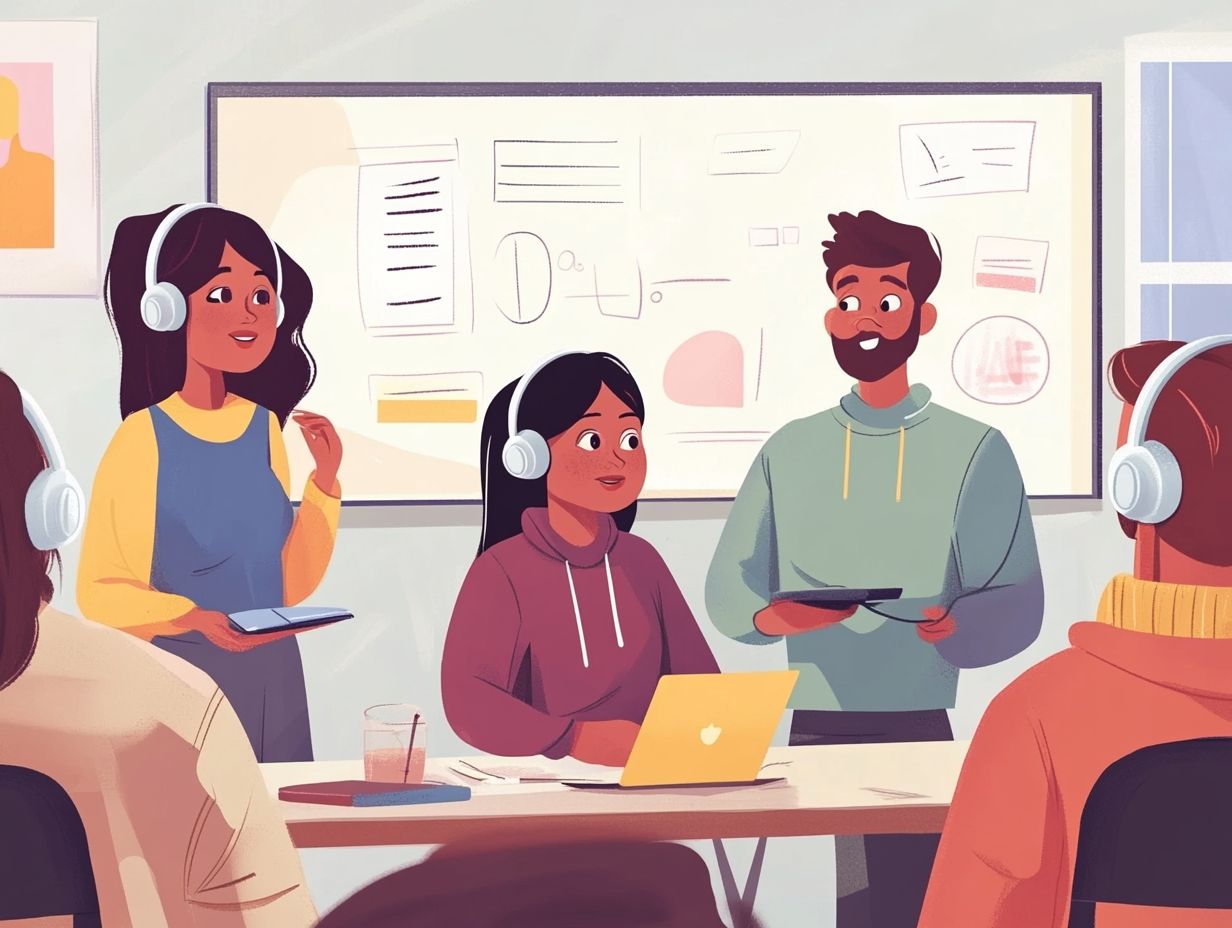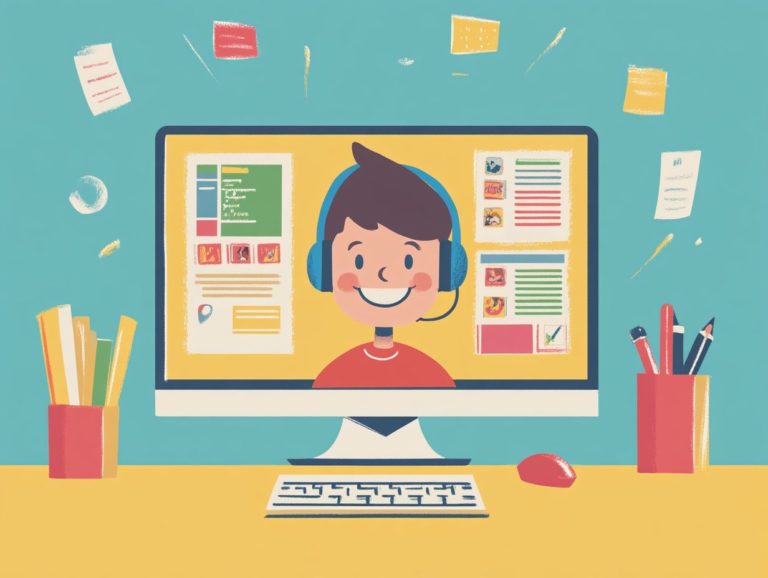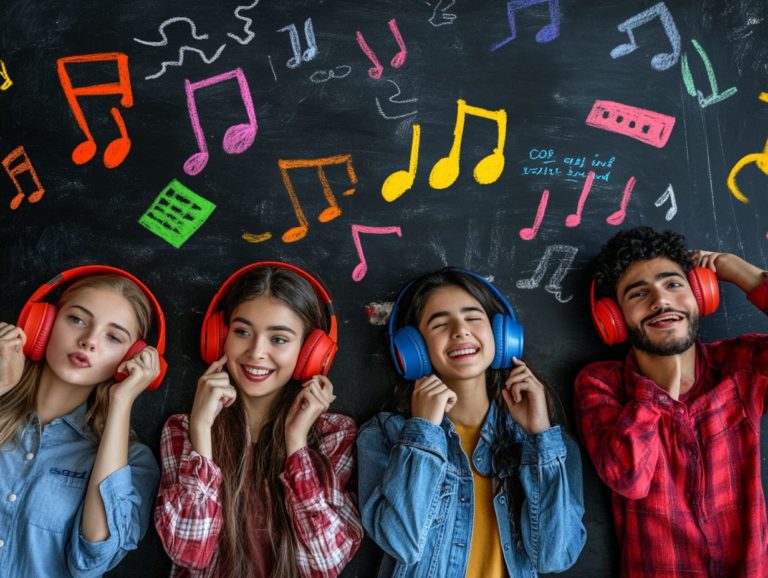5 Strategies to Enhance Listening Skills in a New Language
Mastering a new language transcends the mere acquisition of vocabulary and grammar. It s about grasping the nuances and rhythm of conversation.
Listening skills play a crucial role in effective communication and comprehension. This article delves into five practical strategies designed to enhance your listening abilities. These strategies range from engaging in conversations with native speakers to leveraging audio resources.
By prioritizing active listening and immersing yourself in various contexts, you can elevate your language learning experience and communicate with newfound confidence.
Contents
- Key Takeaways:
- 1. Practice Active Listening
- 2. Dive into Conversations with Native Speakers
- 3. Listen to Native Speakers in Different Situations
- 4. Unlock Your Learning with Audio Resources!
- 5. Take Advantage of Language Exchange Programs
- Why Are Listening Skills Important in Language Learning?
- How Can Active Listening Improve Language Skills?
- What Are the Benefits of Conversing with Native Speakers?
- How Can Exposure to Different Situations Improve Listening Skills?
- What Types of Audio Materials and Resources Can Be Used for Language Learning?
- What Are Language Exchange Programs and How Do They Help with Listening Skills?
- Frequently Asked Questions
- What Are the 5 Strategies to Enhance Listening Skills in a New Language?
- How Does Active Listening Help Improve Listening Skills in a New Language?
- Why Is Repetition and Practice Important for Improving Listening Skills in a New Language?
- How Can Exposure to Native Speakers Enhance Listening Skills in a New Language?
- Why Are Visual Aids Helpful in Enhancing Listening Skills in a New Language?
- Why Is Taking Breaks Important When Working on Listening Skills in a New Language?
Key Takeaways:

- Practice active listening to boost your language skills.
- Talk with native speakers for an authentic touch.
- Expose yourself to different settings to enhance listening.
1. Practice Active Listening
Practicing active listening is crucial for mastering a foreign language. It sharpens your listening skills. This helps you engage with real content and significantly improves your language comprehension. You need to focus fully on the speaker, process both verbal and non-verbal cues, and respond appropriately. These elements foster effective communication across diverse cultural contexts.
Incorporating specific strategies can notably elevate your comprehension skills. For example, summarizing what you’ve heard not only helps consolidate information but also verifies your understanding. Asking questions encourages clarification, prompting deeper engagement. Meanwhile, providing feedback opens up a dialogue that reinforces your learning.
Regularly applying these techniques improves your ability to understand sounds and speech. You ll distinguish subtle nuances in pronunciation and intonation. Consistent practice promotes gradual language proficiency, equipping you with the tools needed to navigate real-life conversations with greater ease and confidence.
2. Dive into Conversations with Native Speakers
Dive into conversations with native speakers! It’s key to unlocking your language potential. This immersion enriches your understanding of authentic cultural contexts and significantly enhances your listening and speaking skills.
Through these interactions, you ll pick up on different speech patterns, emotional nuances, and vocabulary vital for effective communication. Participating in these dialogues dramatically improves your pronunciation, as you receive immediate feedback that helps you mimic the natural flow of speech.
These exchanges not only broaden your vocabulary but also introduce you to diverse sentence structures that make your language use more versatile. Experiencing real-life conversations deepens your understanding of context and meaning, ultimately sharpening your comprehension skills.
Building relationships through these interactions empowers you with the confidence to engage meaningfully and fluently. This approach fills in the gaps that traditional study methods often overlook.
3. Listen to Native Speakers in Different Situations
Listening to native speakers in various situations is crucial for enhancing your listening skills. This practice equips you for real-life conversations and helps you understand the diverse contexts where the language thrives.
This approach allows you to cultivate a nuanced understanding of different accents, speech patterns, and cultural subtleties. For example, engaging with TED Talks exposes you to a rich tapestry of intonation and vocabulary, while podcasts offer a convenient avenue for immersive storytelling.
Music introduces rhythm and slang, adding depth to your linguistic repertoire. On the other hand, movies present colloquial language and expressions in authentic contexts.
Both passive and extensive listening serve as essential auditory stimuli, reinforcing comprehension through repetition and context. To enhance retention, you might consider techniques such as:
- Summarizing main points
- Focusing on keywords
- Practicing listening at varying speeds
These strategies not only refine your pacing but also deepen your overall understanding and connection to the language.
4. Unlock Your Learning with Audio Resources!

Utilizing a rich array of audio materials and online resources is vital in your language learning journey. These amazing tools offer a wealth of resources, providing a treasure trove of audio exercises that enhance both your listening comprehension and pronunciation practice.
Think dictation exercises, podcasts, and language study groups, all meticulously designed to refine your listening skills. TED Talks provide insights into many topics while immersing you in various accents and speaking styles, sharpening your critical listening abilities.
Audiobooks, too, serve as captivating resources, allowing you to delve into narratives at your own pace. This, in turn, reinforces vocabulary and fluency.
By weaving these audio materials into a structured learning plan, you not only access engaging content but also cultivate a profound understanding of the nuances of the language. Interactive lessons, enriched with discussions or reflective journaling on these audio experiences, will significantly elevate your comprehension skills, making your language acquisition journey not just effective, but truly enjoyable.
5. Take Advantage of Language Exchange Programs
Taking advantage of language exchange programs can truly elevate your listening skills. They offer invaluable opportunities for authentic interactions and conversation practice with native speakers.
These exchanges create a mutually beneficial learning environment where cultural contexts are shared, enriching your overall exposure to the language. Platforms like Tandem and HelloTalk allow you to connect with individuals from around the world.
This enables both you and your conversation partner to practice your target languages while engaging in lively discussions. As you converse, you ll find that you not only sharpen your listening strategies but also uncover phrases that mean something different from their individual words and social nuances that textbooks often miss.
This immersive experience deepens your understanding of the language and its cultural background, ultimately leading to more effective communication. Participating in these exchanges enhances your fluency and builds friendships that cross borders, making your language-learning journey all the more rewarding.
Why Are Listening Skills Important in Language Learning?
Listening skills are absolutely fundamental in your language learning journey. They enhance your comprehension and enable you to communicate effectively, allowing for meaningful engagement with native speakers and a deeper immersion in the language.
As you master these skills, you’ll find they facilitate how we hear and understand sounds, helping you recognize sound combinations and speech patterns that are crucial for acquiring new vocabulary.
Effective listening lays the groundwork for understanding grammar and sentence structure, immersing you in authentic language use. In various cultural contexts, being an attentive listener enables you to grasp nuances, idioms, and social cues that are unique to that language.
This enriches your vocabulary and fosters deeper connections with speakers, making your conversations flow more naturally. By honing your listening skills, you cultivate the ability to respond appropriately, which is essential for building confidence and creating a more interactive and rewarding language acquisition experience.
Start exploring these audio resources today and watch your language skills soar!
How Can Active Listening Improve Language Skills?
Active listening is a powerful tool to enhance your language skills. It creates an emotional connection and sharpens comprehension by making you process and understand communication fully.
Reflective listening, where you paraphrase what the speaker has said, helps solidify your understanding. Engaging with the content through gestures like nodding or maintaining eye contact shows attentiveness and builds a connection that helps with recall.
Thus, truly listening, rather than just hearing words, can lead to improved vocabulary retention and conversational prowess. This emotional connection creates a supportive atmosphere, enabling you to take risks, seek clarification, and ultimately become more confident in your language usage.
What Are the Benefits of Conversing with Native Speakers?

Engaging in conversations with native speakers provides you with a wealth of benefits that go far beyond what textbooks can offer. You’ll enhance your vocabulary and refine your pronunciation while gaining a nuanced understanding of cultural contexts that often elude traditional learning.
This real-world practice is essential for honing both your listening and speaking skills. When you immerse yourself in dialogue with fluent speakers, you encounter common phrases that locals use and slang that elevate your linguistic experience.
These interactions can dramatically boost your ability to navigate everyday conversations as you learn to recognize and employ phrases that reflect the richness of cultural nuances. Such exchanges are crucial; they dismantle the barriers of misunderstanding that can crop up when relying solely on written materials.
This interaction helps you grasp the subtleties of tone and context, which are vital for effective communication.
How Can Exposure to Different Situations Improve Listening Skills?
Exposure to different situations can dramatically enhance your listening skills. By immersing yourself in a variety of speech patterns, accents, and contextual cues, you ll become better equipped for comprehension.
Engaging in formal settings, like lectures, offers a structured environment filled with specific vocabulary and academic jargon. This gives you insight into institutional discourse.
On the flip side, casual conversations introduce you to everyday language, slang, and idiomatic expressions that formal instruction often overlooks. As you navigate these varying contexts, you ll cultivate a flexible approach to listening.
This approach boosts your understanding and responsiveness in real-world interactions. Ultimately, this comprehensive exposure will prepare you for a wide array of communication scenarios, arming you with the skills to navigate conversations with confidence and ease.
What Types of Audio Materials and Resources Can Be Used for Language Learning?
A vast array of audio materials and online resources awaits your discovery for language learning, from podcasts and music to TED Talks and dictation exercises. Each of these tools is designed to elevate your listening skills and comprehension.
Consider podcasts, which immerse you in real-life conversations while providing valuable cultural insights. They sharpen your grasp of natural speech patterns.
Music enriches your vocabulary with catchy lyrics, enhancing your pronunciation and rhythm in a delightful way. TED Talks present stimulating ideas in a structured format, prompting you to engage in critical thinking and absorb complex concepts with ease.
Meanwhile, dictation exercises refine your listening precision, bolstering both recall and writing skills. Dive into this exciting world of resources and watch your language skills soar!
By weaving these diverse audio materials into your study plan, you can steadily enhance your listening comprehension and expand your vocabulary, transforming the process of language learning into a truly engaging and rewarding experience.
What Are Language Exchange Programs and How Do They Help with Listening Skills?
Language exchange programs are exceptional platforms that connect you with native speakers. They provide invaluable opportunities to refine your listening skills through engaging conversations and authentic content exposure.
These programs enhance your understanding of cultural contexts, significantly enriching your learning journey. You can participate in structured sessions where you explore topics of interest. This boosts your comprehension while sharing personal stories and cultural insights.
Each exchange fosters a dialogue that sharpens your spoken language skills and cultivates mutual respect and appreciation.
By customizing your sessions to target specific listening goals, you can focus on particular accents or informal phrases, making your learning experience even more effective. This adaptability allows you to progress at your own pace while gaining diverse perspectives that deepen your linguistic and cultural understanding.
Frequently Asked Questions

What Are the 5 Strategies to Enhance Listening Skills in a New Language?
The 5 strategies to enhance listening skills in a new language are: active listening, repetition and practice, exposure to native speakers, using visual aids, and taking breaks.
How Does Active Listening Help Improve Listening Skills in a New Language?
Active listening involves focusing on the speaker and engaging with the content being spoken. This helps improve listening skills by promoting an understanding of the language and its nuances.
Why Is Repetition and Practice Important for Improving Listening Skills in a New Language?
Repeating and practicing makes the brain familiar with the language, making it easier to comprehend and process the spoken information.
How Can Exposure to Native Speakers Enhance Listening Skills in a New Language?
Exposure to native speakers improves listening skills by providing real-life examples of how the language is spoken and allowing for practice in a natural setting.
Why Are Visual Aids Helpful in Enhancing Listening Skills in a New Language?
Visual aids, such as pictures or videos, can provide contextual clues that help with comprehension, thus improving listening skills.
Why Is Taking Breaks Important When Working on Listening Skills in a New Language?
Taking breaks allows the brain to rest and process the information received. This can improve retention and make it easier to continue practicing listening skills in the new language.
Consider participating in language exchange programs to enhance your listening skills and immerse yourself in new cultural experiences.





